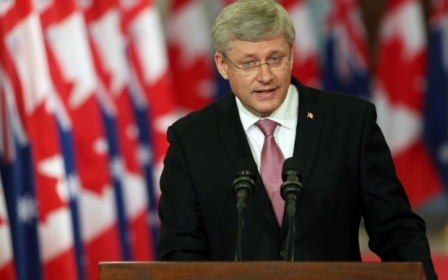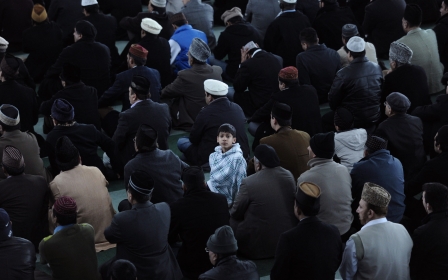US drama series 'Tyrant' ignores failing American foreign policy

It is expected for any leading nation that prides itself in its military prowess, technological advancement and cultural dominance to showcase its perceived superiority through different mediums. Wartime propaganda in particular is of utmost importance, as it reinforces political ideology and rationalises questionable foreign policy. This is evident for anyone who’s watched, read or studied Israeli, Chinese, British, Russian, Indian, Pakistani, Nazi German, Turkish and North Korean wartime propaganda.
However, the United States has arguably surpassed every modern nation in investing billions of dollars in the film and media industry to justify its wars and to dehumanise the hundreds of thousands of people killed in those conflicts. In terms of Hollywood blockbusters and TV series, Homeland, 24, Three Kings, Jarhead, Green Zone and American Sniper come to mind. Whilst these films and series addressed direct US involvement in foreign wars and its subsequent domestic terrorism threat, I naively expected something different from the latest drama series Tyrant - a fictional account of a Middle Eastern dictatorship based on the Arab Spring.
Unlike movies and dramas that illustrate US soldiers fighting the “bad guys” in a “pure-intentioned” manner, strangely, Tyrant stayed well clear of glorifying America’s “just war theory”. Usually it’s home-grown Muslim terrorists, or Russian spies, or just brown-faced “rag-heads” from the desert; in some shape or form; the depiction of America’s enemies are regularly presented as violent foreigners, determined to see the downfall of the “free” Western world.
The producers (Gideon Raff and Howard Gordon) of Tyrant however, chose an alternative style to demonstrate American “greatness”. With the exception of Libya, the US’s role throughout the Arab Spring was not overtly militaristic. Therefore, it made absolute sense that Tyrant would not include the bloody victories commonly associated with Hollywood war movies and dramas.
To my disappointment, the makers of Tyrant completely excluded other aspects of America’s role during the Arab Spring, for example: arming and funding elements of the Syrian opposition, selling weapons to the Bahraini regime during its brutal crackdown on peaceful protestors, endorsing General Abdel Fattah al-Sisi’s military coup against Egypt’s first democratically elected president and supporting Ali Abdullah Saleh of Yemen till the very end. None of these events were even remotely represented in the programme. We cannot be sure whether Raff and Gordon did this intentionally, but taking into consideration that Hollywood and Fox’s warm relationship with Washington is no secret, this certainly cannot be ruled out.
Stereotypes
Tyrant follows the journey of a paediatrician Bassam "Barry" al-Fayeed (Adam Rayner) and his American 2.4 family into the political turmoil of his fictional country of origin, “Abbudin”. However, beyond the mediocre acting and even more predictable “American saviour” storyline, Tyrant illustrates the signature stereotype included in hundreds of Hollywood movies, where Arabs are depicted as uncivilised power-hungry Bedouins, whose only refuge from secular dictatorships and Islamic fundamentalism is liberal democracy.
The peddling of the “clash of civilisations” narrative was common in Hollywood movies during the Cold War, but has become a norm after 9/11 and the subsequent US-led “war on terror”. Knowing very well that a combination of sex and violence is usually a “safe” recipe for a successful drama series, the makers of Tyrant also acknowledged that a good villain or “evil people” was imperative. In this regard, Muslims and Arabs once again fulfilled this essential requirement.
There is no doubt that the American masses will buy into this politically motivated stereotype of Arabs and Muslims, as they did when the Russians and Vietnamese were portrayed during the Cold War. What is of greater concern is that not a single American producer or director (including those behind Tyrant) has ever challenged or attempted to change this false perception, knowing that it has contributed towards the growing problem of Islamophobia and anti-Muslim bigotry in the West.
Season one - The 'American visionary'
Bassam is the younger of two sons of a secular Arab "tyrant," who’s been running from his past for more than two decades. Raised in the US, Bassam has no desire to return to Abbudin until he reluctantly attends his nephew's wedding. Within weeks, Bassam is quickly drawn into the centre of a crisis when his father dies in the midst of a growing popular revolution against the ruling family.
Season one focuses on Bassam’s sincere efforts in trying to guide the new president, his psychotic older brother Jamal (Ashraf Barhom), to reach a political solution that will prevent a bloody civil war. After realising that his brother is beyond help and incapable of wanting peace or free elections, Bassam plans a military coup with the help of the American consulate, the CIA, a disgruntled army general and a rich media tycoon, which is later thwarted. At the end of season one, Bassam is imprisoned for life, charged with treason, with Jamal being pressured by his wife Leila (Moran Atias) and his uncle, General Tariq al-Fayeed (Raad Rawi) to carry out the death sentence.
The CIA’s willingness to facilitate Bassam’s military coup was the only accurate reflection of American foreign policy in the Middle East. Even then, the moral justifications for dethroning Jamal were far from the reality of why the US consistently orchestrates “regime change” operations. It’s rarely ever for the establishment or preservation of democracy, but for its own geopolitical and economic benefits.
Season two - The 'freedom fighter'
Season two begins with Bassam in prison and Jamal still undecided about executing him. With Bassam’s wife Molly (Jennifer Finnigan) exhausting every avenue to get her husband released from prison, Jamal eventually yields to his wife and uncle’s advice and decides to hang his brother. The producers found an unsurprising way to keep the main protagonist alive, when Jamal’s deep love for Bassam results in him being exiled to the desert, whilst the outside world assumed he was executed.
What follows next is a Syria-style subplot, involving an Islamic State-style “caliphate” hell-bent on overthrowing President Jamal for his oppressive policies and chemical attack against the residents of Ma’an - the fictional equivalent of Benghazi or Homs, and the hub of the rebel “Rashid” tribe, who are sworn enemies of the al-Fayeeds. By the time the Caliphate, led by Abu Omar (Darius Homayoun), advances into Ma’an, Bassam has become the leader of the “Red Hand” militia that fights alongside the al-Fayeed regime against the “Islamist extremists”. Just in case you’re wondering how Bassam goes from dying of thirst in the desert to leading a resistance group: he is rescued, hosted and renamed as “Khalil” by Bedouins whose town is later invaded by the caliphate. Bassam is reunited with his son Sammy (Noah Silver), when he decides to donate his $10mn inheritance to the leader of the Red Hand in person, because the caliphate has executed his Arab lover for being homosexual.
As season two draws to an end next week, an increasingly paranoid and isolated President Jamal is oblivious to his wife’s plans to dethrone him, as she secretly releases his bastard son, General Rami (Keon Alexander) from prison to assist Bassam in the final showdown with the caliphate. If I were a betting man, my money would be on Bassam defeating the caliphate, and then going on to finish what he started - removing Jamal from power. Understandably, only America or a “westerner” can save Abbudin - any other ending would be considered treason.
Fox propaganda
Tyrant can hardly be rated as a nail-biting must-watch drama series in comparison to Homeland or 24. In reality, Raff and Gordon have merely produced a fictional and glorified account of how the Obama administration would have liked to have dealt with the Arab Spring and Syria in particular.
In actuality, both seasons of the show reflect the mind-numbing propaganda that is frequently fed to the American public when sugar-coating the country’s ever-failing foreign policy in the Middle East. With Bassam playing the typical “American hero” who wanted to bring democracy to Abbudin in season one, and fighting “Islamist extremists” in season two, Tyrant can officially receive the stamp of approval for having passed the Fox propaganda test.
I cannot deny that Raff and Gordon had accurately depicted Abbudin with the same problems that many Arab states have suffered from for decades - unemployment, poverty, the suppression of political freedoms and religious censorship. However, they failed to deliver any factual contextualisation in how the US has contributed to these issues by either supporting regimes like the al-Fayeeds with money and weapons, or invading and bombing countries like Abbudin for its oil. If Tyrant wanted to gain an ounce of credibility for its political accuracy, then it should have given the US a role to play in the destabilisation of Abbudin. Instead, the producers delegated all the pressure to an American paediatrician-turned-freedom fighter to deliver “democracy” and establish “stability” in a failed Arab state, when in reality, this “rescue mission” would have probably been achieved with fighter jets, tanks and boots on the ground.
- Dilly Hussain is the deputy editor of British Muslim news site 5Pillars. He also writes for the Huffington Post, Al Jazeera English, and contributes to the Foreign Policy Journal and Ceasefire Magazine. He regularly appears on Islam Channel, Russia Today, and BBC TV and radio discussing Middle East and North African politics, British foreign policy, Islamophobia and the war on terror. Find him on Twitter @dillyhussain88
The views expressed in this article belong to the author and do not necessarily reflect the editorial policy of Middle East Eye.
Photo: Producers and actors from the television show 'Tyrant' during the 2014 Television Critics Association Press Tour on 14 January 2014 in Pasadena, California (AFP)
New MEE newsletter: Jerusalem Dispatch
Sign up to get the latest insights and analysis on Israel-Palestine, alongside Turkey Unpacked and other MEE newsletters
Middle East Eye delivers independent and unrivalled coverage and analysis of the Middle East, North Africa and beyond. To learn more about republishing this content and the associated fees, please fill out this form. More about MEE can be found here.





